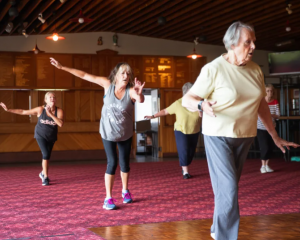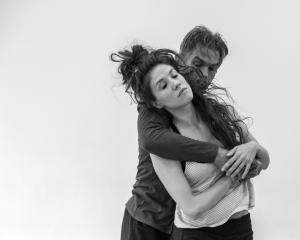
One day "the five-six-seven-eight choreographer" in dance teacher Lucy Marinkovich came out and she knew she had pushed the envelope a bit far.
But it is that learning, as she taught her "InMotion" dance classes for people with Parkinson’s disease in Dunedin last year, that has proved so important.
"There has been a lot of learning for me in what works and does not work. It’s been a real learning curve."
As Caroline Plummer Community Dance Fellow last year, Marinkovich was able to further develop her classes into a "syllabus-like" programme which she is sharing with two Dunedin-based dance teachers to enable the classes to continue even though she has gone back to her home in Wellington.
"I was very conscious that I didn’t want to provide something people would get attached to and help physically and then take it away."
Her and partner musician Lucien Johnson’s dance company, Borderline Arts Ensemble, has also received funding to do the classes in Wellington, as well as facilitate the Dunedin classes.
"It’s spreading. I’m quite excited and chuffed."
It is something she has hoped to be able to do since discovering the United States-based Dance for Parkinson’s programme in a workshop run by an Australian teacher in 2018.
Back then she was just finishing a contract with New Zealand Ballet as its dance educator and found the workshop to be "eye-opening".
"As somebody who has dedicated their life to dance, as an artist it is really moving to see the benefit and joy that can come from these classes as you share what you do."
Being able to share knowledge about the body and body movement with people with Parkinson’s is very special, she says.
It coincided with Marinkovich and Johnson, a composer and saxophonist, being jointly awarded the prestigious Harriet Friedlander New York Residency from the Arts Foundation of New Zealand.
They were totally unaware they were being considered, and the phone call with the news came out of the blue.
"It was mind-blowing. I’m a very physical being and have very physical reactions to stress. I had a quick little vomit, I was so excited. My body just turned inside out on me."
Having already planned their work programmes for the short term to avoid the "dead zones of no income where you are eating Weet-Bix every day", the couple decided to embrace spontaneity and take it up as soon as they could.
So as soon as they had finished development workshops for their New Zealand Festival-commissioned work in early 2019, they left for New York.
The idea of the one-year residency is not to work but to embrace living in the city and be inspired by it.

However, not working does not come naturally to Marinkovich, who has been dancing since she was 5, as she thrives on having back-to-back or concurrent projects on the go.
"I knew I needed some structure."
Aware the Dance for Parkinson’s programme originated from the Brooklyn-based Mark Morris Dance Company, she turned up at the studio and offered her help.
Morris developed and set up the Dance for Parkinson’s programme, and Marinkovich was able to participate in classes and help out where needed.
"It was a real learning journey on so many different levels."
Morris’ idea of using knowledge of the body and movement, garnered through years as a dancer, to help people with Parkinson’s continued to resonate with her.
"Going to the classes gave me confidence that it was something I might be able to do on my return to New Zealand. It felt like the right thing to do."
Receiving the fellowship in Dunedin was the icing on the cake, enabling her to really develop a programme she has named "InMotion: Dancing with Parkinson’s".
"It is such a special fellowship. It’s extremely prestigious and has been a little dream of mine for a number of years since I heard about it from a previous fellow and colleague, Lyne Pringle, when I first started at Footnote Dance Company."
Marinkovich’s dance classes start off seated, before they move to using the back of the chair, in a way similar to a ballet barre, and then to standalone movements.
She likes to create a "vocabulary" for herself, basing moves around a concept or theme. In Dunedin that included dances influenced by the city’s falling autumn leaves or a character based on the opera Carmen or the "Colonel Bogey March" from the Bridge On the River Kwai.
They worked up to a jazz-inspired piece performed to Mack the Knife and their "magnum opus" was choreographed to "Dance of the Knights", from Sir Kenneth MacMillan’s production of Sergei Prokofiev's ballet score Romeo and Juliet.
Another important aspect of the classes is the ability to respond to the needs of those taking part, as the very diverse symptoms of Parkinson’s affect people in different ways.
"I can choreograph specific movements to address symptoms or to help deal with them."
But what makes the classes really special, she says, is the use of live music, something that even professional dancers do not often get to practise to.
There is plenty of scientific information about music’s impact on the brain and wellbeing, and in the classes it also helps keep participants on their toes.
"It makes you pull your socks up a little bit. It creates a very special artistic experience."
In Dunedin they were lucky to have Dunedin Symphony Orchestra concert master and violinist Tessa Petersen play for them.

‘‘She was phenomenal, so generous and her music was sublime and I could often see her moving her feet at the same time. She contributed so much.’’
In Wellington, she often has Johnson play piano for the classes.
The music also emphasises that these classes are not physical therapy classes — they are an "artistic experience", where participants use their bodies emotively and theatrically.
"Like any dance class I’m checking their posture, flexibility, agility, co-ordination. All key skills whether you are a professional dancer or a student."
The programme seemed to hit the mark with the Dunedin participants, she says.
"I loved them to pieces. We had a lot of laughter. I’m not strict but I have high expectations of them but they were so gorgeous, so funny."

So she was gutted when last year’s lockdown resulted in the cancellation of the last of her classes.
"I was really disappointed in the premature way my fellowship ended."
However, given the danger Covid poses to many of her students, she did not want to put them at any future risk, so she went back to Wellington.
She plans to return this year to do a proper handover with the new teachers Donnine Harrison from Good Company Arts and Anna Noonan, a former dance colleague of Marinkovich’s who has taught Parkinson’s dance classes overseas.
There are also plans for her to give a talk to wrap up her fellowship experiences, and she is also keen to catch up with this year’s Caroline Plummer fellow Michael Parmenter, a mentor and collaborator of hers who taught her at the New Zealand School of Dance and choreographed a work on her while she was at Footnote Dance Company.
"He’s been a very special person in my artistic development, and I adore what he is doing with folk classes."
In the meantime, she and her partner have bought a cottage on the Kapiti Coast and are otherwise planning a quieter year.
Marinkovich’s busy nature means alongside teaching and her own dance work, she also does choreographic work with Borderline, creating dance theatre productions. As with any small company that also means doing many of the behind-the-scenes roles as well.
Borderline's surrealist-inspired Lobsters won three Wellington Theatre Awards, and Strasbourg 1518, its latest commission which premiered in the 2020 New Zealand Festival, explored the true story of a dance epidemic from the Middle Ages, and featured Parmenter.
"This last couple of years has been the longest I’ve been based in New Zealand since I was 16 years old. We’re travelling creatures and have moved a lot, so the change has been nice, but also difficult being grounded for so long. It’s been a very odd change."
She had five months of work booked across Asia in 2020 when Covid hit, wiping it all out.
This year they have decided to concentrate on researching and developing their next round of shows.
"I could not cope with another season of cancellations. It was heartbreaking — not only financially, it is our livelihood — but we pour ourselves into these creations. All our energy, focus, drive and love is wrapped into it. To have that obliterated is devastating. So hopefully it’ll be calmer this year."











